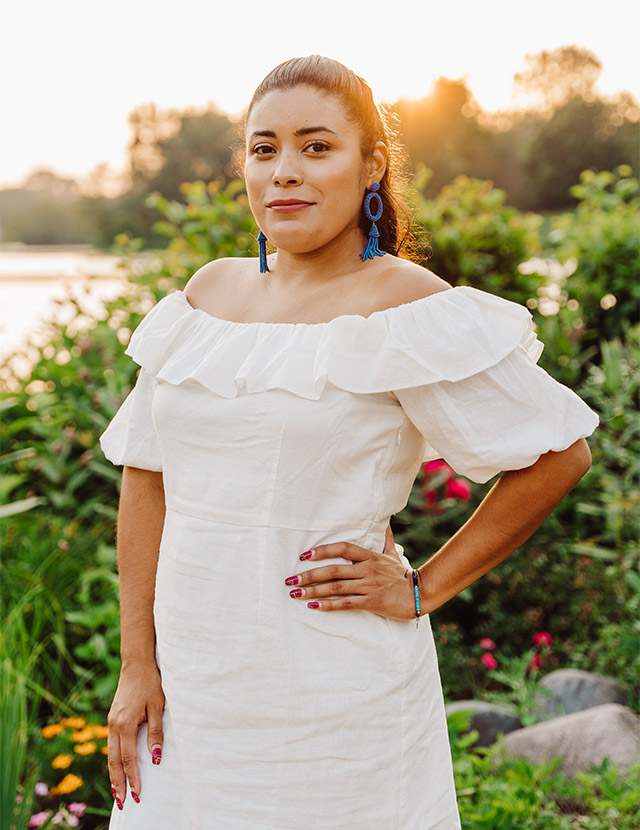|
Getting your Trinity Audio player ready...
|
Mayra Macias had no plans for a career in politics. The daughter of Mexican immigrants, she comes from a working-class family with no political connections.
Today, she is the executive director at Building Back Together, the advocacy group advancing the Biden-Harris policy agenda. Macias is one of the youngest people leading a national political organization, let alone one as heavy with power and clout.
“I got into politics as a detour,” Macias says. “Growing up in Chicago, people are very political and part of it is patronage politics. I grew up canvassing for aldermen. It wasn’t necessarily because my family was passionate about their candidacy. It felt more transactional, like if this person gets elected it might open doors for the family to get better jobs. So, I grew up with a very negative feeling towards politics. I often thought it was very transactional.”
Time in Miami as an instructor for Teach For America changed her perspective.
“You name an issue, and I saw it play out in my classroom,” Macias remembers. “There was this moment of reckoning of my own privilege. I’d gone to a Title I school, and I grew up in a very working-class community. But it wasn’t until Florida that I realized that even though I came from all of these things, I had the luxury of voting—or not voting—and my life would not drastically change.”
“I didn’t think of it as a career move. It was something I felt compelled to do. That was over a decade ago, and I’m finally coming to terms with the realization that this is a career and not just a detour.”
Mayra Macias
Macias is quick to add that even though she participated as a voter in every election she’s been eligible for, that was the start and end of her civic engagement back then. Her time in the South in a swing state, where elections were more volatile and less predictable, made her realize how important voting was.
“A lot of the issues that were preventing my kids from learning and me from teaching were linked back to policy,” Macias says. “That’s when I made the pivot from being in the classroom to becoming an organizer in Little Havana, Miami, for President Obama’s re-election.”
Macias focused on electing local and national leaders that were going to support communities like the one she grew up in and the one she was teaching in. She began as a field organizer during the 2012 presidential cycle and then jumped into statewide races. As the teacher-turned-political operative racked up wins, she grew into leadership roles.
“I didn’t think of it as a career move,” she states with resolve. “It was something I felt compelled to do. That was over a decade ago, and I’m finally coming to terms with the realization that this is a career and not just a detour.”
By 2016, the year Donald Trump was elected, Macias was the political director for the Florida Democratic Party. The threat of Trump policies on marginalized communities fueled Macias to stay actively involved in political work rather than take time off after the election (a customary act by many campaign staffers to compensate for the long hours logged during the sprint toward election day).
“Once Donald Trump got elected, there was no ‘take a step back,’ there was no ‘take time off,’” Macias explains. “The stakes were so increasingly life or death for many people, including for Latinos.”

Prior to joining Building Back Together, Macias served first as national political director and then executive director for the Latino Victory. Eva Longoria and Henry R. Muñoz cofounded the organization in 2014 to build political power within the Latino community. It is considered one of the most influential organizations at the intersection of Latinos and politics. There, Macias clinched a 74 percent win rate for the sixty-eight candidates the organization endorsed in 2018.
The Chicago native is a self-described overachiever, a trait that’s evident far before her career began. She attended Whitney M. Young Magnet High School—one of the city’s most competitive high schools for enrollment and which counts Michelle Obama as an alumna—and received her bachelor’s degree from Yale University. The same energy used to make quantum leaps in her education was now being funneled into ensuring Trump wasn’t re-elected. Family time and personal endeavors took a backseat to Macias political mission.
“Working in the Trump era of politics, I was left so depleted,” Macias says. “I began to question what I wanted my legacy to be. I’ve realized that we don’t have infinite time, and there will always be another election.”
Macias remembers a childhood where her parents focused on her happiness rather than projecting their definition of success onto her. Her mother attended college in Mexico and stayed at home to raise Mayra and her two siblings. Her father had an elementary school education and worked many manual labor jobs—waste collector for Chicago’s Department of Streets and Sanitation, factory work, and lamp maker to name a few—to provide for the family.
She grew up seeing family members with limited access to education and opportunities so when a door would open for her, Macias would sprint—not walk—right through it. Her family is at the heart of her work. And while much of her work was for them, it left little room for personal self-fulfillment.
“I’m very much driven to make the most of [the opportunities given to me],” Macias says. “For a while, a part of my drive for success was fueled by this sense of guilt that I was given this chance and other people in my family weren’t. I [felt I] needed to make the most of it.”
The daughter of immigrants has grown to be one of the most well-known and respected leaders on Capitol Hill. She has a reputation for delivering results and investing in the people around her. She may have gotten to where she is by grinding it out on behalf of those who never had the chance to step in the same rooms as she did, but her greatest success might just be rethinking how she approaches her work.
“I would no longer say I’m driven by guilt,” she says. “It’s a sense of responsibility to my community and family.”

